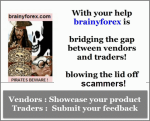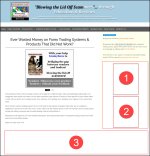Foreign exchange market history;
Most participants motivated
to make money
Buying and selling currencies to make money in the Foreign Exchange Market has been the driving force for participants.
Ninety-five percent of all foreign currency transactions are done by banks, companies and individual traders with the motive to make money from the changing exchange rate. The other five percent of transactions are facilitated in relation to the buying and selling of products and services abroad by businesses and individuals.
With the huge flow of money, several trillion dollars daily there has
been a niche available for highly experienced traders to make money
from the buying and selling of currencies. Most of these experienced
traders have learned the art of forex trading from working for many
years for large banking institutions whom traded currencies as a part of
their normal banking operations.
In more recent times some of these experienced individuals and other
trading enthusiasts have written automated trading programs that fully
automate the buying and selling of currencies.
The success of these automated forex trading systems has been well established in trading competitions like the 2008 Automated Trading Championships hosted by MetaQuotes Corp. Read more about these automated trading robots here.
It was only a matter of time before some of these programs were
offered to the hungry forex trading community and others whom had always
had the dream of making money by having their own home based business
trading currencies. Read more about forex trading as a home business here.
The history of the foreign exchange market
The foreign exchange market, also known as FOREX or FX is where
banks and other official institutions facilitate the buying and selling
of foreign currencies. Foreign currency transactions typically involve
one party purchasing a quantity of one currency in exchange for paying a
quantity of another.
The foreign exchange market that we see today started evolving
during the 1970s when world over countries gradually switched to a
floating exchange rate from the fixed Bretton Woods system.
Presently, the foreign exchange market is one of the largest and
most liquid financial markets in the world, and includes trading between
large banks, central banks, currency traders / speculators,
corporations, governments, and other institutions.
The average daily volume in the global foreign exchange and
related markets is continuously growing. Traditional daily turnover was
reported to be over US$3.2 trillion in April 2007 by the Bank for
International Settlements. Since then, the market has continued to grow.
According to Euromoney's annual FX Poll, volumes grew a further 41%
between 2007 and 2008.
The purpose of Foreign exchange market is to facilitate trade and
investment. The need for a foreign exchange market arises because of
the presence of hundreds of diverse international currencies such as US
Dollar, Pound Sterling, Japanese Yen etc.
"Foreign Exchange Trading" is to buy in a kind of money from a
pair of money combination and sell out the other kind of money at the
same time. Foreign exchange is traded by money/form, for example,
EUR/USD or USD/JPY.
As far as investors for the purpose of making money is concerned,
the best dealing opportunity is to trade in the currency dealing
customarily (and therefore, it is of the biggest flow), which is called
"Major Money". Today, about 85% daily dealings is these major
currencies, including USD, JPY, EUR, GBP, CHF, CAD and AUD.
Foreign exchange market is a global 24-hour dealing market, and
the trading is started in Sydney for each day, and business day from
each of the global financial center will be started one by one along
with movement of the earth, Tokyo is the second, London and New York are
following. Unlike other financial markets, investors of foreign
exchange are able to buy or sell at any moment for fluctuations of
foreign exchange resulting from economic, social and political events
whenever they happen day time or at night as the market is always open.
(Not open weekends with the exception of Oanda which is open 7 days a
week).
Foreign exchange market is a dealing market of OTC
(over-the-counter) or "inter bank". Unlike stock and futures trading
market, foreign exchange is not traded by a centralized exchange.
Leverage Up to 1000:1
Through large institutions (security dealers) anybody (traders, speculators or hedgers) whom wants to take a position in a currency transaction are normally offered a high degree of leverage. In the early days the norm offered was leverage of 100:1. This would mean that $1 can control $100 worth of currencies. ie 1%.
With the increase in popularity amongst traders and financial
institutions competing for business, recent years have seen an increase
in the leverage offered. Some institutions even offering 1000:1 leverage but more typically around 500:1.
This type of leverage is seen as a powerful tool to make money
yet also dangerous for the uneducated whom cannot manage this type of
risk. Some assert that high leverage is necessary in the foreign
exchange market because the fluctuation of the average price on the
major currencies is less than 1% for each day, whereas the price of a
stock can easily change by 10% in any given day.
Those desirous to become speculators or traders and make money with currency trading are encouraged to use test their judgment or skills through demo accounts first. That way they can see first hand how everything works without risking any money.





